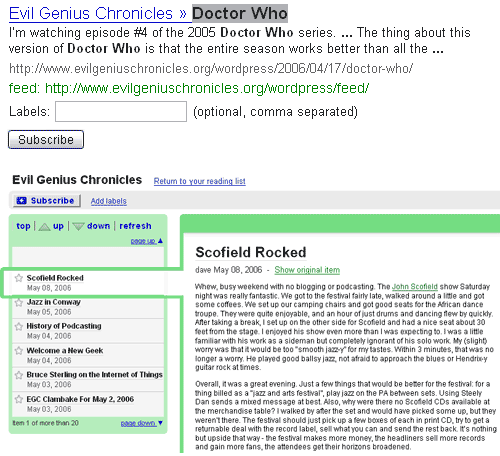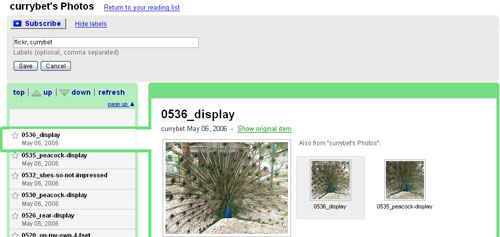Testing Google Reader - part two
I've been auditioning online RSS readers as potential replacements for Bloglines. Yesterday I started taking a look at Google Reader, and have been distinctly unimpressed so far.
I liked the concept of being able to use search to find types of content that I might want to subscribe to, but I found in practice it was lacking some finesse, and actually became quite frustrating. For example, searching for RSS content about Doctor Who bought up the expected feeds from Outpost Gallifrey and the official BBC site, but it also bought up a selection of individual posts about the show. One of these was from 'Evil Genius Chronicles', and from the snippet it looked like it might be worth reading. However, clicking the title or the URL takes you through to the most recent content for the feed, rather than the content displayed in the search results. In fact the only way to read the article was to cut-n-paste the article URL out of the search results manually. It was really counter-intuitive.

One thing I did like was how the reader handled subscribing to a Flickr photostream - with a nice thumbnail strip of the recent entries. Google Reader allow users to tag feeds using labels, and I was impressed that unlike Rojo or FeedLounge the Google Reader UI explicitly explains to you how to add multiple labels with the information that they are optional and comma separated.

Another thing I found hard to get to grips with was how the posts were ordered on the main reading page. Not only wasn't it ordered by feed, it wasn't ordered chronologically either, and seemed somewhat random. In my list were posts from feeds I had just recently subscribed to, and posts from currybetdotnet from back in November 2005.
The other serious flaw with Google Reader is that despite the AJAX interface, it just seems so slow to perform straightforward operations - I got thoroughly sick and tired of the loading lab bottle.

Unlike a lot of Google's beta-labelled services, the Google Reader really does still seem like a 'beta' that requires considerable work - at the moment it just simply isn't a contender as an online RSS reader compared to Bloglines, FeedLounge or Rojo.